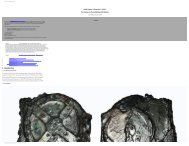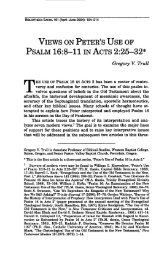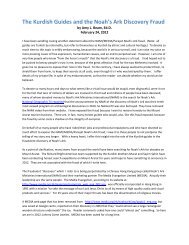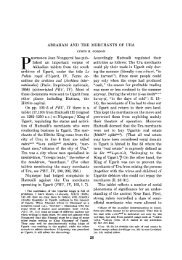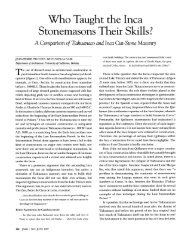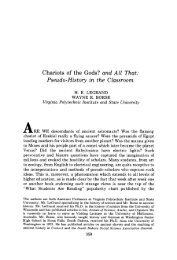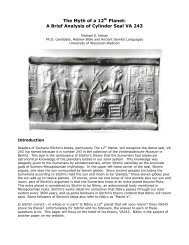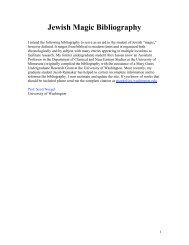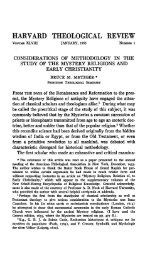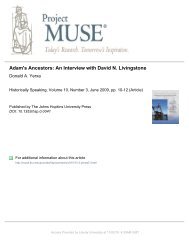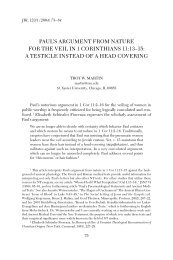Was Junia Really an Apostle? - Michael S Heiser.com
Was Junia Really an Apostle? - Michael S Heiser.com
Was Junia Really an Apostle? - Michael S Heiser.com
You also want an ePaper? Increase the reach of your titles
YUMPU automatically turns print PDFs into web optimized ePapers that Google loves.
76<br />
New Test. Stud. 47, pp. 76–91. Printed in the United Kingdom © 2001 Cambridge University Press<br />
<strong>Was</strong> <strong>Junia</strong> <strong>Really</strong> <strong>an</strong> <strong>Apostle</strong>?<br />
A Re-examination of Rom 16.7 1<br />
MICHAEL H. BURER AND DANIEL B. WALLACE<br />
Dallas Theological Seminary, 3909 Swiss Avenue, Dallas, TX 75204, USA<br />
The identification of <strong>Junia</strong> in Rom 16.7 has been a familiar problem in biblical<br />
interpretation. Most studies, however, are preoccupied with the gender of the<br />
name, assuming that <strong>Junia</strong>’s apostolic status is not in doubt. This article addresses<br />
the latter issue. The collocation of ejpivshmo~ with its adjuncts shows that, as a rule,<br />
ejpivshmo~ with a genitive personal adjunct indicates <strong>an</strong> inclusive <strong>com</strong>parison (‘outst<strong>an</strong>ding<br />
among’), while ejpivshmo~ with (ejn plus) the personal dative indicates <strong>an</strong><br />
elative notion without the implication of inclusion (‘well known to’). This study<br />
concludes that <strong>Junia</strong> was well known to the apostles rather th<strong>an</strong> outst<strong>an</strong>ding<br />
among them.<br />
In Rom 16.7, there are two issues relev<strong>an</strong>t to biblical ‘gynaecology’. The first is<br />
whether ∆Iouni<strong>an</strong> is a m<strong>an</strong>’s name or a wom<strong>an</strong>’s. The second is whether this individual<br />
is part of the apostolic b<strong>an</strong>d. The first issue has garnered a great deal of<br />
attention, with quite a bit of evidence enlisted on both sides. But the second has<br />
been the object of almost no subst<strong>an</strong>tive discussion; indeed, most <strong>com</strong>mentators<br />
simply assume a particular viewpoint that has surprisingly never been demonstrated.<br />
We will address the first issue briefly, as it is somewhat t<strong>an</strong>gential to our<br />
overall thesis.<br />
The name ∆Iouni<strong>an</strong> c<strong>an</strong> be accented in one of two ways: ’Iouniv<strong>an</strong> with <strong>an</strong> acute<br />
accent on the penult, which is feminine, or ∆Iounia`n with a circumflex accent on<br />
the ultima, which is masculine. The majority of patristic <strong>com</strong>mentators regard this<br />
as a feminine name. 2 Origen seems to cite the name once as masculine <strong>an</strong>d once<br />
as feminine, though the masculine is most likely a later corruption of his text. 3<br />
1 We wish to express our gratitude to Professor C. F. D. Moule <strong>an</strong>d Dr D. H. Wallace for their<br />
valuable input on this essay after looking at a preliminary draft.<br />
2 J. Fitzmyer, Rom<strong>an</strong>s: A New Tr<strong>an</strong>slation with Introduction <strong>an</strong>d Commentary (AB 33; Garden<br />
City, NY: Doubleday, 1993) 737–8, mentions Ambrosiaster, Chrysostom, Rufinus, Jerome,<br />
Theodoret of Cyrrhus, Ps.-Primasius, Oecumenius, John Damascene, Haymo, Rab<strong>an</strong>us<br />
Maurus, Hatto, L<strong>an</strong>fr<strong>an</strong>c of Bec, Bruno the Carthusi<strong>an</strong>, Theophylact, Peter Abelard, <strong>an</strong>d Peter<br />
Lombard.<br />
3 <strong>Junia</strong> occurs in In epistola ad Rom<strong>an</strong>os 10.21 (PG 14.1280), but <strong>Junia</strong>s occurs in 10.39 (PG<br />
http://journals.cambridge.org Downloaded: 28 Jul 2009 IP address: 208.95.48.254
<strong>Was</strong> <strong>Junia</strong> <strong>Really</strong> <strong>an</strong> <strong>Apostle</strong>? Rom 16.7 Re-examined 77<br />
Although most <strong>com</strong>mentators believe that the patristic evidence through the first<br />
1,200 years or so universally supports the feminine name, 4 one patristic writer is<br />
inexplicably overlooked. Epiph<strong>an</strong>ius (c.315–403 CE), bishop of Salamis in Cyprus,<br />
mentions <strong>Junia</strong>s in his Index discipulorum 125: ∆Iounia`~, ou| kai; aujtou` oJ Pau`lo~<br />
mevmnhtai, ejpivskopo~ ∆Apameiva~ th`~ Suriva~ ejgevneto (‘<strong>Junia</strong>s, whom Paul also<br />
mentions, became bishop of Apameia of Syria’). That <strong>Junia</strong>s is masculine here is<br />
evident from the masculine relative pronoun (ou|) following the name. 5 Epiph<strong>an</strong>ius’s<br />
reference is unusual in that he only indirectly alludes to Rom 16.7, but<br />
adds additional information about <strong>Junia</strong>s, perhaps preserving <strong>an</strong> independent<br />
tradition. 6 However, Epiph<strong>an</strong>ius’s testimony here ought not to be weighed too<br />
heavily, for he calls Prisca in the previous sentence a m<strong>an</strong>, too! 7 A search of TLG 8<br />
14.1289). Rab<strong>an</strong>us Maurus in In epistola ad Rom<strong>an</strong>os (PL 111.1607–8) cites Origen, In epistola<br />
ad Rom<strong>an</strong>os 10.39, but uses the feminine form. Because of this some have asserted that<br />
Origen’s text here is corrupt. Moo notes that Rufinus’s tr<strong>an</strong>slation of Origen’s <strong>com</strong>mentary in<br />
PG 14.1281B <strong>an</strong>d 1289A reads a masculine name. ‘But Migne’s text (notoriously corrupt) is<br />
probably in error; Origen apparently read a feminine name here . . .’ (D. J. Moo, The Epistle to<br />
the Rom<strong>an</strong>s [NICNT; Gr<strong>an</strong>d Rapids: Eerdm<strong>an</strong>s, 1996] 922).<br />
4 Aegidus of Rome (1245–1316 CE) called both Andronicus <strong>an</strong>d Juli<strong>an</strong> men in his Opera Exegetica,<br />
Opuscula I.<br />
5 TLG (see n. 8) inexplicably accents the name ∆Iouniva~.<br />
6 J. Piper <strong>an</strong>d W. Grudem, ‘An Overview of Central Concerns: Questions <strong>an</strong>d Answers’, in J. Piper<br />
<strong>an</strong>d W. Grudem, eds., Recovering Biblical M<strong>an</strong>hood <strong>an</strong>d Wom<strong>an</strong>hood: A Response to<br />
Ev<strong>an</strong>gelical Feminism (Wheaton, IL: Crossway, 1991) 80, argue: ‘The Church Fathers were evidently<br />
divided . . ., Epiph<strong>an</strong>ius assuming [∆Iounia] is masculine, Chrysostom assuming it is<br />
feminine. Perhaps somewhat more weight may be given to the statement by Epiph<strong>an</strong>ius,<br />
since he appears to know more specific information about <strong>Junia</strong>s (that he became bishop of<br />
Apameia), while Chrysostom gives no more information th<strong>an</strong> what he could deduce from<br />
Rom<strong>an</strong>s 16:7.’<br />
6 As recently as April 2000, this evidence continues to be overlooked. S. Schreiber, ‘Arbeit mit<br />
der Gemeinde (Röm 16.6, 12). Zur versunkenen Möglichkeit der Gemeindeleitung durch<br />
Frauen’, NTS 46 (2000) 212, asserts: ‘Entscheidend jedoch ist, daß in der Antike lediglich der<br />
weibliche Name <strong>Junia</strong> bezeugt ist und die kirchliche Tradition von den Vätern bis zu den<br />
Kommentaren des Mittelalters von <strong>Junia</strong> als einer Frau ausgeht; der lateinische Name “<strong>Junia</strong>”<br />
ist zeitgenössisch geläufig. Das ist in der gegenwärtigen Forschung längst aufgewiesen und<br />
nahezu Allgemeingut.’ The author cites much of the st<strong>an</strong>dard literature but does not mention<br />
Grudem <strong>an</strong>d Piper’s evidence to the contrary. In all fairness, even though Epiph<strong>an</strong>ius’s identification<br />
of <strong>Junia</strong> as a m<strong>an</strong> is almost surely incorrect (see below), his voice must be accounted<br />
for in the tabulation of patristic evidence.<br />
7 Index discipulorum 125: Pri`ska~, ou| kai; aujtou` Pau`lo~ mevmnhtai, ejpivskopo~ Kolofw`no~<br />
ejgevneto. Again, TLG accents the name Privska~. It should be noted that the masculine pronouns<br />
alone presuppose the masculine name since ejpivskopo~ is a double terminal adjective,<br />
used subst<strong>an</strong>tivally for both men <strong>an</strong>d women.<br />
8 TLG, or Thesaurus Linguae Graecae CD ROM D, is a digitized database of Greek texts from<br />
Homer to 1453 CE, currently <strong>com</strong>prising some 57 million Greek words (Los Altos, CA: Packard<br />
Hum<strong>an</strong>ities Institute, 1993). Produced under the auspices of the Packard Hum<strong>an</strong>ities<br />
Institute, it is now marketed by the University of California at Irvine. Although we have not<br />
http://journals.cambridge.org Downloaded: 28 Jul 2009 IP address: 208.95.48.254
78 michael h. burer <strong>an</strong>d d<strong>an</strong>iel b. wallace<br />
for the text string iounia at the beginning of a word yielded only one viable hit<br />
outside of biblical or patristic citations, <strong>an</strong>d this name is obviously feminine:<br />
∆Iouniva ga;r ajdelfh`/<br />
Brouvtou sunwv/kei<br />
Kavssio~, mentioned by Plutarch. 9 BAGD<br />
cites this name (as used in Rom 16.7) as masculine, 10 but the forth<strong>com</strong>ing edition<br />
(to be known as BDAG) argues that the form ∆Iouniva is to be preferred. 11 This is in<br />
keeping with the current trends of scholarship as well, for in the past two decades<br />
the tide has swung decidedly over to the side of the feminine form. To remove<br />
paraphrasis <strong>an</strong>d reduce cumbersome expressions – <strong>an</strong>d because we le<strong>an</strong> towards<br />
this underst<strong>an</strong>ding as well – we will treat this name as feminine.<br />
A brief history of <strong>Junia</strong>’s apostleship<br />
Whether ∆Iouni<strong>an</strong> is male or female is not the only contribution of this<br />
verse to biblical gynaecology. The relation of <strong>Junia</strong> to the apostles is also in view.<br />
On this issue, there is a growing consensus: <strong>Junia</strong> is <strong>an</strong> apostle. That is, the text is<br />
read as follows: ‘Greet Andronicus <strong>an</strong>d <strong>Junia</strong>, my relatives who were in prison with<br />
me, who are outst<strong>an</strong>ding among the apostles.’ The expression in question is<br />
ejpivshmoi ejn toi`~ ajpostovloi~. The vast bulk of tr<strong>an</strong>slations <strong>an</strong>d <strong>com</strong>mentators<br />
today regard this line as indicating that Andronicus <strong>an</strong>d <strong>Junia</strong> were apostles,<br />
though not in the most technical sense of that word. What is interesting is that<br />
battle lines are almost always drawn along the gender of ∆Iouni<strong>an</strong>, as though it<br />
were already a settled issue that this individual finds a place among the apostolic<br />
b<strong>an</strong>d. It is the assumption of <strong>Junia</strong>’s apostolic status, however, that we wish to<br />
challenge.<br />
Before we get into the evidence, it might be helpful to note the history of the<br />
discussion. Fr<strong>an</strong>kly, this will not take very long. 12 To be sure, there is <strong>an</strong> abund<strong>an</strong>ce<br />
yet received our copy, CD ROM E has recently been released (4 Feb 2000); it contains 6,625<br />
works from 1,823 authors, <strong>an</strong>d a total count of 76 million words of text. The cover letter to TLG<br />
subscribers notes that ‘This is a signific<strong>an</strong>t exp<strong>an</strong>sion <strong>com</strong>pared to the 57 million words<br />
(from 831 authors <strong>an</strong>d 4,305 works) included in CD ROM D’. We do not know on what information<br />
Piper <strong>an</strong>d Grudem based their statement that the previous version to the one we are<br />
using, CD ROM C, ‘contains 2,889 authors <strong>an</strong>d 8,203 works’ (Piper <strong>an</strong>d Grudem, ‘Overview’,<br />
79).<br />
9 Plutarch Brut. 7.1.4.<br />
10 See ‘∆Iounia`~∆, 380: ‘The possibility, fr. a purely lexical point of view, that this is a wom<strong>an</strong>’s<br />
name . . . is prob. ruled out by the context . . .’<br />
11 See ‘∆Iouniva’ <strong>an</strong>d ‘∆Iounia`~’ in BDAG.<br />
12 We have already noted that the patristic authors are preoccupied with whether ∆Iouni<strong>an</strong> is<br />
male or female, giving little subst<strong>an</strong>tive attention to what Paul has to say about this individual’s<br />
relation to the apostolic b<strong>an</strong>d. That they seem to assume a particular view, without<br />
interacting over the force of the Greek, is hardly a sufficient reason to adopt their view, as<br />
Lightfoot, Fitzmyer, et al. have done. This situation is akin to modern English preachers<br />
http://journals.cambridge.org Downloaded: 28 Jul 2009 IP address: 208.95.48.254
<strong>Was</strong> <strong>Junia</strong> <strong>Really</strong> <strong>an</strong> <strong>Apostle</strong>? Rom 16.7 Re-examined 79<br />
of secondary material which discusses the various questions arising from Rom<br />
16.7. But by <strong>an</strong>d large, the identification of ∆Iouni<strong>an</strong> – whether this name refers to<br />
a m<strong>an</strong> or a wom<strong>an</strong> – is the question most often discussed in the literature, with<br />
Paul’s intended sense of ajpovstolo~ a close second. Only rarely is the syntax of<br />
ejpivshmo~ with its adjuncts discussed at all.<br />
For convenience’ sake, we will label the two views regarding <strong>Junia</strong>’s apostolic<br />
status. The approach that regards Andronicus <strong>an</strong>d <strong>Junia</strong> as in some sense apostles<br />
we will call the inclusive view; the interpretation that regards them as non-apostles<br />
we will call the exclusive view. 13 The inclusive view is thus represented in the<br />
tr<strong>an</strong>slation ‘outst<strong>an</strong>ding among the apostles’ while the exclusive view is seen in<br />
the tr<strong>an</strong>slation ‘well known to the apostles’.<br />
The vast bulk of <strong>com</strong>mentators follow the inclusive view; most of those who do<br />
see ajpovstolo~ used in a broad sense. 14 And almost always, the inclusive interpretation<br />
is simply assumed, with little or no support. For example, Dunn states that<br />
‘the full phrase almost certainly me<strong>an</strong>s “prominent among the apostles” ’, <strong>an</strong>d he<br />
cites other authorities as his defence. 15 Cr<strong>an</strong>field, after admitting that the exclusive<br />
view is ‘grammatically possible’, goes on to say: ‘it is much more probable – we<br />
might well say, virtually certain – that the words me<strong>an</strong> “outst<strong>an</strong>ding among the<br />
apostles . . .” ’, 16 enlisting patristic assumptions on his behalf. Rengstorf lays the<br />
assuming that Rev 3.20 speaks of the risen Christ penetrating a person’s heart – in spite of the<br />
fact that such a view is not even based on a careful reading of the English text, let alone the<br />
Greek! (On this text, cf. D. B. Wallace, Greek Grammar beyond the Basics: An Exegetical Syntax<br />
of the New Testament [Gr<strong>an</strong>d Rapids: Zonderv<strong>an</strong>, 1996] 380–2.)<br />
13 We are taking our cue from R. S. Cervin, ‘A Note Regarding the Name “<strong>Junia</strong>(s)” in Rom<strong>an</strong>s<br />
16.7’, NTS 40 (1994) 470.<br />
14 So J. Calvin, Commentaries on the Epistle of Paul the <strong>Apostle</strong> to the Rom<strong>an</strong>s (1540; repr. Gr<strong>an</strong>d<br />
Rapids: Eerdm<strong>an</strong>s, 1957) 546; J. B. Lightfoot, The Epistle of St Paul to the Galati<strong>an</strong>s (London:<br />
Macmill<strong>an</strong>, 1865) 96 n. 1; A. Schlatter, Gottes Gerechtigkeit: Ein Kommentar zum Römerbrief<br />
(Stuttgart: Calwer, 41965) 399–400; C. K. Barrett, A Commentary on the Epistle to the Rom<strong>an</strong>s<br />
(HNTC; S<strong>an</strong> Fr<strong>an</strong>cisco: Harper & Row, 1957) 283–4; J. Huby, Saint Paul: Épître aux Romains<br />
(Paris: S. Lyonnet, 1957) 499–500; C. H. Dodd, The Epistle of Paul to the Rom<strong>an</strong>s (Font<strong>an</strong>a;<br />
London: Collins, 1959) 240; O. Michel, Der Brief <strong>an</strong> die Römer (KEK; Göttingen: V<strong>an</strong>denhoeck<br />
& Ruprecht, 1978) 475–6; C. E. B. Cr<strong>an</strong>field, The Epistle to the Rom<strong>an</strong>s (ICC; Edinburgh: T. & T.<br />
Clark, 1975–9) 2.789; E. Käsem<strong>an</strong>n, Commentary on Rom<strong>an</strong>s (Gr<strong>an</strong>d Rapids: Eerdm<strong>an</strong>s, 1980)<br />
414; U. Wilckens, Der Brief <strong>an</strong> die Römer (EKKNT; Neukirchen–Vluyn: Neukirchener und<br />
Zürich: Benziger, 1978–81) 3.135; L. Morris, The Epistle to the Rom<strong>an</strong>s (Gr<strong>an</strong>d Rapids:<br />
Eerdm<strong>an</strong>s, 1988) 534.<br />
14 J. D. G. Dunn, Rom<strong>an</strong>s (WBC 38AB; Dallas: Word, 1988) 2.895, takes a narrower view of<br />
ajpovstolo~ while maintaining the inclusive view. He argues from the phrase oi} kai; pro; ejmou`<br />
gevgon<strong>an</strong> ejn Cristw/` <strong>an</strong>d from 1 Cor 15.7 that Andronicus <strong>an</strong>d <strong>Junia</strong> ‘belonged to the closed<br />
group of apostles appointed directly by the risen Christ in a limited period following his resurrection’.<br />
15 Dunn, Rom<strong>an</strong>s, 2.894.<br />
16 Cr<strong>an</strong>field, Rom<strong>an</strong>s, 2.789.<br />
http://journals.cambridge.org Downloaded: 28 Jul 2009 IP address: 208.95.48.254
80 michael h. burer <strong>an</strong>d d<strong>an</strong>iel b. wallace<br />
blame at Paul’s feet: ‘If Paul had me<strong>an</strong>t the second [the exclusive view] he could<br />
<strong>an</strong>d should have expressed himself more clearly’! 17 Schreiner notes merely that the<br />
inclusive interpretation is ‘the consensus view’, <strong>an</strong>d that it ‘is almost surely right,<br />
for this is a more natural way of underst<strong>an</strong>ding the prepositional phrase’. 18<br />
Some <strong>com</strong>mentators do appeal, however, to other lines of evidence to bolster<br />
this approach. Fitzmyer accepts that Andronicus <strong>an</strong>d <strong>Junia</strong> were apostles largely<br />
on the basis of patristic testimony, but only discusses the me<strong>an</strong>ing of the prepositional<br />
phrase ejn toi`~ ajpostovloi~. 19 Godet accepts the majority view (viz., that<br />
Andronicus <strong>an</strong>d <strong>Junia</strong> were apostles), but adds a negative line of reasoning: Paul<br />
does not me<strong>an</strong> ‘well known by the apostles’ because ejn most likely does not carry<br />
the me<strong>an</strong>ing ‘in the eyes of’. 20 S<strong>an</strong>day <strong>an</strong>d Headlam add a positive line of reasoning<br />
to accept this interpretation: ejpivshmo~ has a literal me<strong>an</strong>ing of ‘stamped’ or<br />
‘marked’ <strong>an</strong>d this would most naturally refer to ‘those who were selected from the<br />
Apostolic body as “distinguished” ’. 21 The most detailed argumentation for the<br />
view that Andronicus <strong>an</strong>d <strong>Junia</strong> were regarded as apostles <strong>com</strong>es from Moo. If this<br />
phrase were to me<strong>an</strong> ‘esteemed by the apostles’, ejn would have to have <strong>an</strong> instrumental<br />
force or be equivalent to the Hebrew ‘in the eyes of’. However, ‘with a<br />
plural object, ejn often me<strong>an</strong>s “among”; <strong>an</strong>d if Paul had w<strong>an</strong>ted to say that<br />
Andronicus <strong>an</strong>d <strong>Junia</strong> were esteemed “by” the apostles, we would have expected<br />
him to use a simple dative or uJpov with the genitive’. 22<br />
The kind of certainty embraced by the inclusive camp may well be traced back<br />
to Lightfoot. He states: ‘Except to escape the difficulty involved in such <strong>an</strong> extension<br />
of the apostolate, I do not think the words oi{tinev~ eijsin ejpivshmoi ejn toi`~<br />
ajpostovloi~ would have been generally rendered, “who are highly esteemed by the<br />
<strong>Apostle</strong>s”.’ 23 Although Lightfoot offers no support other th<strong>an</strong> that the inclusive<br />
view was adopted by the Greek fathers, his reputation as a careful grammatical<br />
exegete was legendary, prompting Schmithals to claim that Lightfoot has shut the<br />
door on the exclusive view: ‘J. B. Lightfoot has already established that ejpivshmoi ejn<br />
toi`~ ajpostovloi~ does not me<strong>an</strong> “regarded by the apostles” but rather “regarded as<br />
apostles” ’! He adds that this tr<strong>an</strong>slation ‘is the only natural one’. 24 The same sen-<br />
17 K. H. Rengstorf, ‘ejpivshmo~’, TDNT 7.268 n. 1.<br />
18 T. R. Schreiner, Rom<strong>an</strong>s (Baker Exegetical Commentary on the New Testament; Gr<strong>an</strong>d Rapids:<br />
Baker, 1998) 796.<br />
19 Fitzmyer, Rom<strong>an</strong>s, 739–40.<br />
20 F. L. Godet, Commentary on the Epistle to the Rom<strong>an</strong>s (New York: Funk & Wagnall’s, 1883) 492.<br />
Contra R. Cornely, Epistola ad Rom<strong>an</strong>os (Paris: P. Lethielleux, 1896) 776–7.<br />
21 W. S<strong>an</strong>day <strong>an</strong>d A. C. Headlam, A Critical <strong>an</strong>d Exegetical Commentary on the Epistle to the<br />
Rom<strong>an</strong>s (ICC; Edinburgh: T. & T. Clark, 51902) 423.<br />
22 Moo, Rom<strong>an</strong>s, 923 n. 38.<br />
23 Lightfoot, Galati<strong>an</strong>s, 96.<br />
24 W. Schmithals, The Office of the <strong>Apostle</strong> in the Early Church (Nashville: Abingdon, 1969) 62<br />
(italics added), citing only Lightfoot, Galati<strong>an</strong>s, 96.<br />
http://journals.cambridge.org Downloaded: 28 Jul 2009 IP address: 208.95.48.254
<strong>Was</strong> <strong>Junia</strong> <strong>Really</strong> <strong>an</strong> <strong>Apostle</strong>? Rom 16.7 Re-examined 81<br />
timent, though not necessarily mentioning Lightfoot by name, is found in numerous<br />
<strong>com</strong>mentaries that espouse the inclusive view. 25<br />
Commentators who adopt the exclusive view – that is, that Andronicus <strong>an</strong>d<br />
<strong>Junia</strong> were well known or esteemed by the apostles but were not apostles themselves<br />
– tend to supply a little more evidence as a whole since they are in the minority,<br />
although they still generally do not address the full grammatical evidence.<br />
Hodge argues that Paul uses ajpovstolo~ only ‘in its strict, official sense’. 26 The<br />
article toi`~ before the term ‘seems to point out the definite, well-known class of<br />
persons almost exclusively so called’. 27 Murray also argues that this is the preferred<br />
interpretation because of Paul’s limited use of the term. 28 Lenski argues along<br />
these lines but adds to the evidence:<br />
In the first place, Paul never uses ‘apostle’ in the wider sense; in the second place,<br />
when it is so used (Barnabas, Acts 14:4, 14), the word still keeps its me<strong>an</strong>ing: ‘one<br />
<strong>com</strong>missioned <strong>an</strong>d sent,’ even as Barnabas was <strong>com</strong>missioned together with<br />
Paul (Acts 13:2–4), <strong>an</strong>d is never used concerning men (or women) who go out of<br />
their own accord . . . Thirdly, ejn states where these two were considered<br />
illustrious: ‘in the circle of’ the Twelve at Jerusalem (‘by’ is incorrect). 29<br />
Zahn accepts this minority interpretation based upon one major line of negative<br />
evidence: if Andronicus <strong>an</strong>d <strong>Junia</strong> were well-known apostles, it is remarkable that<br />
scripture is otherwise <strong>com</strong>pletely silent about them: ‘Der Ausdruck und der<br />
Umst<strong>an</strong>d, daß wir sonst nichts von einer solchen Bedeutung dieser Leute hören,<br />
machen es doch wahrscheinlicher, daß damit gesagt sein soll, daß sie im Kreise<br />
der älteren Apostel, welche Pl auch Gl 1, 19; 1 Kr 15, 7 die Apostel schlechthin nennt,<br />
in gutem Ansehen stehen.’ 30 And again, ‘Warum schrieb Pl d<strong>an</strong>n nicht ajpovstoloi<br />
25 Besides the <strong>com</strong>mentaries mentioned, older works such as those by Luther, Bengel, <strong>an</strong>d<br />
Tholuck held the inclusive view as well. Note also Cervin, ‘ “<strong>Junia</strong>(s)” ’, 470: ‘he wrote oi{tinev~<br />
eijsin ejpivshmoi ejn toi`~ ajpostovloi~ which c<strong>an</strong> only me<strong>an</strong> “noteworthy among the apostles” ’.<br />
Our impression is that within two or three decades of the publication of Lightfoot’s <strong>com</strong>mentary<br />
on Galati<strong>an</strong>s, <strong>an</strong>d largely because of it, the inclusive view became the majority opinion. But<br />
the situation was decidedly different shortly after it was published. C. Hodge, Commentary on<br />
the Epistle to the Rom<strong>an</strong>s (New York: Hodder & Stoughton, rev. edn 1883) 449, notes that ‘the<br />
majority of <strong>com</strong>mentators’ held to the exclusive view in his day.<br />
26 Hodge, Rom<strong>an</strong>s, 449.<br />
27 Ibid.<br />
28 J. Murray, The Epistle to the Rom<strong>an</strong>s (NICNT; Gr<strong>an</strong>d Rapids: Eerdm<strong>an</strong>s, 1959–65) 2.229–30. So<br />
also H. A. W. Meyer, Critical <strong>an</strong>d Exegetical H<strong>an</strong>d-Book to the Epistle to the Rom<strong>an</strong>s (New York:<br />
Funk <strong>an</strong>d Wagnalls, rev. edn 1889) 568, with special reference to 1 Cor 15.7; F. A. Philippi,<br />
Commentar über den Brief Pauli <strong>an</strong> die Römer (Fr<strong>an</strong>kfurt: Heyder & Zimmer, 21856) 622, with<br />
special reference to Acts 14.4, 14.<br />
29 R. C. H. Lenski, The Interpretation of St. Paul’s Epistle to the Rom<strong>an</strong>s (Minneapolis: Augsburg,<br />
1961) 906–7.<br />
30 T. Zahn, Der Brief des Paulus <strong>an</strong> die Römer (Kommentar zum Neuen Testament 6; Leipzig: A.<br />
Deichert, 1910) 608.<br />
http://journals.cambridge.org Downloaded: 28 Jul 2009 IP address: 208.95.48.254
82 michael h. burer <strong>an</strong>d d<strong>an</strong>iel b. wallace<br />
ejpivshmoi? Das Praes. eujsivn [sic] würde bei jener Deutung voraussetzen, daß sie<br />
zur Zeit des Rm noch immer in hervorragender Weise als Missionare tätig waren.<br />
Um so wunderlicher wäre das Schweigen der AG und der <strong>an</strong>deren Briefe.’ 31<br />
On the whole, ‘exclusive’ <strong>com</strong>mentators do not adequately discuss the syntax<br />
of ejpivshmo~ with its adjuncts. When the construction is discussed, focus is on the<br />
prepositional phrase ejn toi`~ ajpostovloi~ <strong>an</strong>d the me<strong>an</strong>ing of ejn, not on the collocation<br />
of ejpivshmo~ with prepositional phrases. 32<br />
The situation with specialized studies concerning the role of women in the<br />
church is much the same. The vast majority of authors favour the inclusive view,<br />
but most studies do not deal with the grammatical evidence of ejpivshmo~ with its<br />
adjuncts. Like the <strong>com</strong>mentaries cited above, m<strong>an</strong>y studies simply argue that the<br />
name refers to a wom<strong>an</strong> <strong>an</strong>d that ajpovstolo~ is used here in a general sense, i.e. as<br />
one sent by the church for <strong>an</strong> appointed task. 33 Yet some claim, without support-<br />
31 Ibid., n. 61.<br />
32 Cf. also S. T. Bloomfield, The Greek Testament, with English Notes, Critical, Philological, <strong>an</strong>d<br />
Exegetical, 5th Americ<strong>an</strong> edn (Philadelphia: Perkins & Purves, 1844) 2.91 n. 7; W. M. L. de Wette,<br />
Kurze Erklärung des Briefes <strong>an</strong> die Römer, 4th rev. <strong>an</strong>d augmented edn (Kurzgefasstes<br />
exegetisches H<strong>an</strong>dbuch zum Neuen Testament; Leipzig: Weidm<strong>an</strong>n, 1847) 2.197; W. G. T.<br />
Shedd, A Critical <strong>an</strong>d Doctrinal Commentary on the Epistle of St. Paul to the Rom<strong>an</strong>s (New<br />
York: Scribner’s, 1879) 426–7. Cornely, Rom<strong>an</strong>os, 776–7, states: ‘Similiter dissentiunt interpretes,<br />
quo sensu ratio illa intelligenda sit, ob quam Paulus illos suo nomine salutari velit:<br />
oi{tinev~ eijsin ejpivshmoi ejn toi`~ ajpostovloi~ (quia sunt illustres in apostolis). Cum Orig. et<br />
Chrys. enim <strong>an</strong>tiquiores et iuniores plerique . . . eos inter apostolos latiore sensu, i.e. inter<br />
ev<strong>an</strong>gelicos operarios praeclaris suis laboribus eminuisse et in Ecclesia illustres fuisse arbitr<strong>an</strong>tur.<br />
Praeeuntibus autem Haym. et Tolet. moderni haud pauci . . . eos apud Apostolos<br />
(stricto sensu) illustres fuisse, i.e. ab eis magni aestimatos esse tenent. Quam alteram sententiam<br />
praeferimus, non t<strong>an</strong>tum quia definita locutio oiJ ajpovstoloi non nisi de Duodecim<br />
aut saltem de Apostolis stricto sensu in Scripturis semper adhibetur, sed etiam quia iuxta<br />
h<strong>an</strong>c interpretationem ultimum membrum (qui et <strong>an</strong>te me fuerunt in Christo i.e. Christi<strong>an</strong>i)<br />
aptius adiungitur.’ Among the older <strong>com</strong>mentators not already cited who embraced the<br />
exclusive view are Beza, Grotius, <strong>an</strong>d Fritsche. Schreiner’s assessment is on the mark when he<br />
states: ‘Murray (1965:230) is virtually alone among modern <strong>com</strong>mentators in underst<strong>an</strong>ding it<br />
[ejpivshmoi ejn toi`~ ajpostovloi~] as “outst<strong>an</strong>ding in the eyes of the apostles” [italics added].’<br />
33 M. Adinolfi, ‘Le Collaboratrici Ministeriali di Paolo nelle Lettere ai Rom<strong>an</strong>i e ai Filippesi’, BeO<br />
17 (1975) 31; B. Brooten, ‘ “<strong>Junia</strong> . . . Outst<strong>an</strong>ding Among the <strong>Apostle</strong>s” (Rom<strong>an</strong>s 16:7)’, in L.<br />
Swidler <strong>an</strong>d A. Swidler, eds., Women Priests: A Catholic Commentary on the Vatic<strong>an</strong><br />
Declaration (New York: Paulist, 1977) 141–4; P. K. Jewett, The Ordination of Women: An Essay on<br />
the Office of Christi<strong>an</strong> Ministry (Gr<strong>an</strong>d Rapids: Eerdm<strong>an</strong>s, 1980) 70–1; D. M. Scholer, ‘Paul’s<br />
Women Co-Workers in the Ministry of the Church’, Daughters of Sarah 6.4 (1980) 5–6; E. M.<br />
Howe, Women & Church Leadership (Gr<strong>an</strong>d Rapids: Zonderv<strong>an</strong>, 1982) 34–6; M. J. Ev<strong>an</strong>s,<br />
Wom<strong>an</strong> in the Bible: An Overview of All the Crucial Passages on Women’s Roles (Downers<br />
Grove, IL: InterVarsity, 1984) 124; B. J. Brooten, ‘Women <strong>an</strong>d the Churches in Early<br />
Christi<strong>an</strong>ity’, Ecumenical Trends 14.4 (1985) 52; K. Giles, ‘<strong>Apostle</strong>s Before <strong>an</strong>d After Paul’, Chm<br />
99 (1985) 249–50; E. Schüssler Fiorenza, ‘Missionaries, <strong>Apostle</strong>s, Coworkers: Rom<strong>an</strong>s 16 <strong>an</strong>d<br />
the Reconstruction of Women’s Early Christi<strong>an</strong> History’, WW 6 (1986) 430–1; P. Richardson,<br />
http://journals.cambridge.org Downloaded: 28 Jul 2009 IP address: 208.95.48.254
<strong>Was</strong> <strong>Junia</strong> <strong>Really</strong> <strong>an</strong> <strong>Apostle</strong>? Rom 16.7 Re-examined 83<br />
ing evidence, that ‘the natural me<strong>an</strong>ing in Greek is that they were outst<strong>an</strong>ding as<br />
apostles’. 34 Some are more nu<strong>an</strong>ced in their argumentation concerning the me<strong>an</strong>ing<br />
of ajpovstolo~. Grenz <strong>an</strong>d Kjesbo, for example, argue that there are four different<br />
possible me<strong>an</strong>ings for ajpovstolo~: the Twelve; witnesses to the resurrection<br />
whom Jesus <strong>com</strong>missioned into special ministry; those <strong>com</strong>missioned by a congregation<br />
to spread the gospel; <strong>an</strong>d those <strong>com</strong>missioned by a church for specific<br />
tasks. They classify <strong>Junia</strong> as <strong>an</strong> apostle of the third type, accepting the interpret-<br />
ation that she was considered <strong>an</strong> apostle. 35 Other studies assess the me<strong>an</strong>ing of<br />
ejpivshmoi ejn toi`~ ajpostovloi~ but do not specifically address the relationship<br />
of ejpivshmo~ to its adjuncts. 36 Cervin is more detailed in that he does address some<br />
of the grammatical evidence, but only concerning the prepositional phrase: ‘the<br />
[tr<strong>an</strong>slation] “by the apostles” expresses the agent of a passive verb (or in this case,<br />
adjective)’ <strong>an</strong>d would only be valid if the Greek were uJpov plus the genitive case.<br />
The Greek text is ‘ejn � the dative case, which is used to denote impersonal instrument<br />
or me<strong>an</strong>s’. 37 Only a few studies accept the exclusive view, but the reasoning<br />
is in<strong>com</strong>plete <strong>an</strong>d does not deal with the lexical or syntactical evidence. 38<br />
Modern tr<strong>an</strong>slations, as would be expected in light of the exegetical literature,<br />
usually view Paul’s friends here as part of the apostolic b<strong>an</strong>d. The NIV <strong>an</strong>d NASB<br />
say that Andronicus <strong>an</strong>d <strong>Junia</strong>(s) are ‘outst<strong>an</strong>ding among the apostles’; TEV has<br />
‘well known among the apostles’; the NRSV <strong>an</strong>d NAB say they are ‘prominent<br />
among the apostles’; Reina Valera has ‘muy estimados entre los apóstoles’; Phillips<br />
‘From <strong>Apostle</strong>s to Virgins: Rom<strong>an</strong>s 16 <strong>an</strong>d the Roles of Women in the Early Church’, TJT 2<br />
(1986) 238–9; C. S. Keener, Paul, Women <strong>an</strong>d Wives (Peabody, MA: Hendrickson, 1992) 241–42;<br />
J. Thorley, ‘<strong>Junia</strong>, a Wom<strong>an</strong> <strong>Apostle</strong>,’ NovT 38 (1996) 18–29; R. M. Groothuis, Good News for<br />
Women: A Biblical Picture of Gender Equality (Gr<strong>an</strong>d Rapids: Baker, 1997) 194–6.<br />
34 So Scholer, ‘Women Co-Workers’, 6. Cf. also Keener, Paul, Women <strong>an</strong>d Wives, 242, whom<br />
Groothuis simply quotes with approbation (Good News, 195); similarly, V. Fàbrega, ‘War<br />
<strong>Junia</strong>(s), der hervorragende Apostel (Rom 16,7), eine Frau?’, JAC 27–28 (1984–5) 48; R. R.<br />
Schulz, ‘Rom<strong>an</strong>s 16:7: <strong>Junia</strong> or <strong>Junia</strong>s?’, ExpTim 98.4 (1987) 110. Giles dogmatically states, after<br />
agreeing with Schmithals that the inclusive view is ‘the only natural one’, that ‘the only basis<br />
for objection to the inclusion of <strong>Junia</strong> among the apostles is one which rests on the premise:<br />
no wom<strong>an</strong> by definition c<strong>an</strong> be <strong>an</strong> apostle’ (‘<strong>Apostle</strong>s’, 250).<br />
35 S. J. Grenz <strong>an</strong>d D. M. Kjesbo, Women in the Church: A Biblical Theology of Women in Ministry<br />
(Downers Grove, IL: InterVarsity, 1995) 92–6. So also E. Schüssler Fiorenza, ‘The <strong>Apostle</strong>ship<br />
of Women in Early Christi<strong>an</strong>ity’, in Swidler <strong>an</strong>d Swidler, eds., Women Priests, 135–40, although<br />
her wording <strong>an</strong>d terminology are slightly different.<br />
36 J. B. Hurley, M<strong>an</strong> <strong>an</strong>d Wom<strong>an</strong> in Biblical Perspective (Gr<strong>an</strong>d Rapids: Zonderv<strong>an</strong>, 1981) 121–2;<br />
Piper <strong>an</strong>d Grudem, ‘Overview’, 79–81. A. B. Spencer, Beyond the Curse: Women Called to<br />
Ministry (Nashville: Thomas Nelson, 1985), discusses the adjective <strong>an</strong>d preposition in the<br />
same paragraph – even arguing erroneously that ‘the preposition en always has the idea of<br />
“within” ’, but does not produce <strong>an</strong>y inst<strong>an</strong>ces of the collocation (185).<br />
37 Cervin, ‘ “<strong>Junia</strong>(s)” ’, 470.<br />
38 H. W. House, The Role of Women in Ministry Today (Nashville: Thomas Nelson, 1990) 77; M. A.<br />
Kassi<strong>an</strong>, Women, Creation, <strong>an</strong>d the Fall (Westchester, IL: Crossway, 1990) 129–30.<br />
http://journals.cambridge.org Downloaded: 28 Jul 2009 IP address: 208.95.48.254
84 michael h. burer <strong>an</strong>d d<strong>an</strong>iel b. wallace<br />
speaks of them as ‘outst<strong>an</strong>ding men among the messengers’; Nouvelle Version<br />
Segond Révisée (NVSR) has ‘très estimés parmi les apôtres’; the REB has ‘eminent<br />
among the apostles’; Luther Revision (1985) has ‘berühmt sind unter den<br />
Aposteln’; NJB says ‘Greetings to those outst<strong>an</strong>ding apostles’; New Century<br />
Version calls them ‘very import<strong>an</strong>t apostles’. Some tr<strong>an</strong>slations seemed a bit more<br />
ambiguous, however: KJV reads ‘who are of note among the apostles’, as does the<br />
ASV, RSV, NKJV, <strong>an</strong>d Douay-Rheims. Only a h<strong>an</strong>dful of tr<strong>an</strong>slations took the construction<br />
to me<strong>an</strong> that Andronicus <strong>an</strong>d <strong>Junia</strong> were not apostles: the CEV has<br />
‘highly respected by the apostles’; Amplified reads ‘They are men held in high<br />
esteem by the apostles’; <strong>an</strong>d the New English Tr<strong>an</strong>slation (NET) calls them ‘well<br />
known to the apostles’.<br />
In sum, over the past three decades the exclusive view has been only scarcely<br />
attested in tr<strong>an</strong>slations or exegetical <strong>an</strong>d theological literature. Yet the arguments<br />
against it are largely a kind of snowballing dogma that has little of subst<strong>an</strong>ce at its<br />
core.<br />
Evidence that <strong>Junia</strong> was not <strong>an</strong> apostle<br />
The thesis of this article is that the expression ejpivshmoi ejn toi`~ ajpostovloi~<br />
is more naturally taken with <strong>an</strong> exclusive force rather th<strong>an</strong> <strong>an</strong> inclusive one.<br />
The lexical <strong>an</strong>d syntactical evidence seem to support this hypothesis.<br />
First, the lexical issue. ejpivshmo~ c<strong>an</strong> me<strong>an</strong> ‘well known, prominent, outst<strong>an</strong>ding,<br />
famous, notable, notorious’. 39 The lexical domain c<strong>an</strong> roughly be broken down<br />
into two streams: ejpivshmo~ is used either in <strong>an</strong> implied <strong>com</strong>parative sense<br />
(‘prominent, outst<strong>an</strong>ding [among]’) or in <strong>an</strong> elative sense (‘famous, well known<br />
[to/by]’).<br />
Second, the key to determining the me<strong>an</strong>ing of the term in <strong>an</strong>y given passage<br />
is both the general context <strong>an</strong>d the specific collocation of this word with its<br />
adjuncts. Hence, we turn to the ejn toi`~ ajpostovloi~. As a working hypothesis,<br />
we would suggest the following. Since a noun in the genitive is typically used<br />
with <strong>com</strong>parative adjectives, we might expect such with <strong>an</strong> implied <strong>com</strong>parison<br />
too. Thus, if in Rom 16.7 Paul me<strong>an</strong>t to say that Andronicus <strong>an</strong>d <strong>Junia</strong> were<br />
outst<strong>an</strong>ding among the apostles, we might have expected him to use the genitive40<br />
(tw`n) ajpostovlwn. On the other h<strong>an</strong>d, if <strong>an</strong> elative force is suggested – i.e.<br />
where no <strong>com</strong>parison is even hinted at – we might expect ejn � the dative. It<br />
should be noted that this is merely a working hypothesis, <strong>an</strong>d one that is falsifiable.<br />
As <strong>an</strong> aside, some <strong>com</strong>mentators reject such <strong>an</strong> elative sense in this passage<br />
39 BAGD 298 s.v. ejpivshmo~; LSJ 655–6; L&N 28.31.<br />
40 Either the simple genitive, or one after the preposition ejk.<br />
http://journals.cambridge.org Downloaded: 28 Jul 2009 IP address: 208.95.48.254
<strong>Was</strong> <strong>Junia</strong> <strong>Really</strong> <strong>an</strong> <strong>Apostle</strong>? Rom 16.7 Re-examined 85<br />
because of the collocation with the preposition ejn; 41 but such a view is based on a<br />
misperception of the force of the whole construction. On the one h<strong>an</strong>d, there is<br />
a legitimate <strong>com</strong>plaint about seeing ejn with the dative as indicating <strong>an</strong> agent:<br />
such a usage is rare to non-existent in the NT. Thus, to the extent that ‘well known<br />
by the apostles’ implies <strong>an</strong> action on the apostles’ part, such <strong>an</strong> objection has<br />
merit. 42 On the other h<strong>an</strong>d, the idea of something being known by someone else<br />
does not necessarily imply agency. This is so for two reasons. First, the ‘action’<br />
implied may actually be the passive reception of some event or person (e.g. in texts<br />
such as 1 Tim 3.16, in which w[fqh ajggevloi~ c<strong>an</strong> be tr<strong>an</strong>slated either as ‘was seen by<br />
<strong>an</strong>gels’ or as ‘appeared to <strong>an</strong>gels’; either way the ‘action’ performed by <strong>an</strong>gels is by<br />
its very nature relatively passive). 43 Such <strong>an</strong> idea c<strong>an</strong> be easily ac<strong>com</strong>modated in<br />
Rom 16.7: ‘well known to/by the apostles’ simply says that the apostles were recipients<br />
of information, not that they actively performed ‘knowing’. Thus, although<br />
ejn plus a personal dative does not indicate agency, in collocation with words of<br />
perception, the construction (ejn plus) dative personal nouns is often used to show<br />
the recipients. In this inst<strong>an</strong>ce, the idea would then be ‘well known to the apostles’.<br />
Second, even if ejn with the dative plural is used in the sense of ‘among’ (so Moo<br />
here, et alii), this does not necessarily locate Andronicus <strong>an</strong>d <strong>Junia</strong> within the<br />
b<strong>an</strong>d of apostles; rather, it is equally possible, ex hypothesi, that knowledge of them<br />
existed among the apostles.<br />
Finally, to make sure we are ‘<strong>com</strong>paring apples with apples’, the subst<strong>an</strong>tival<br />
adjunct (i.e. either the noun in the genitive or the object of the preposition ejn)<br />
should be personal. This gives us the closest parallels to Rom 16.7. However,<br />
because of the potential paucity of data, both personal <strong>an</strong>d impersonal constructions<br />
will be examined.<br />
We now turn to the actual data. A search of TLG, the published volumes of the<br />
Oxyrhynchus Papyri, Tebtunis papyri, <strong>an</strong>d the digitized collections of papyri from<br />
41 Moo, for example, writes: ‘if Paul had w<strong>an</strong>ted to say that Andronicus <strong>an</strong>d <strong>Junia</strong> were esteemed<br />
“by” the apostles, we would have expected him to use a simple dative or uJpov with the genitive’<br />
(Moo, Rom<strong>an</strong>s, 923). Cf. also Cervin, ‘ “<strong>Junia</strong>(s)” ’, 470.<br />
42 Cf. Wallace, Exegetical Syntax, 163–6, where it is indicated that the only clear texts in the NT<br />
in which a dative of agency occurs involve a perfect passive verb; in the discussion of ejn with<br />
dative (373–4), it is suggested that there are ‘no unambiguous examples’ of this idiom. Cf. also<br />
BDR 154 (§191), who admit that Luke 23.15 contains the lone genuine example of dative of<br />
agency in the NT.<br />
43 Wallace, Exegetical Syntax, 165 n. 72, states: ‘It is not insignific<strong>an</strong>t that virtually every time<br />
w[fqh is used in the NT with a simple dat., the subject of the verb consciously initiates the visible<br />
m<strong>an</strong>ifestation; in no inst<strong>an</strong>ce c<strong>an</strong> it be said that the person(s) in the dat. case initiate(s)<br />
the act. In other words, volition rests wholly with the subject, while the dat. noun is merely<br />
recipient. Cf. Luke 1:11; 22:43; 24:34; Acts 7:2, 26, 30; 13:31; 16:9; 1 Cor 15:5, 6, 7, 8. (The only problematic<br />
texts are Mark 9:4 <strong>an</strong>d its parallel, Matt 17:3; but even here the appear<strong>an</strong>ce of Elijah<br />
<strong>an</strong>d Moses was clearly not <strong>an</strong>ticipated by the disciples.)’<br />
http://journals.cambridge.org Downloaded: 28 Jul 2009 IP address: 208.95.48.254
86 michael h. burer <strong>an</strong>d d<strong>an</strong>iel b. wallace<br />
Duke University <strong>an</strong>d the University of Michig<strong>an</strong> – a gr<strong>an</strong>d total of more th<strong>an</strong> 60<br />
million words of Greek literature 44 from Homer to 1453 CE – produced several hun-<br />
dred pages of text. ejpivshmo~ <strong>an</strong>d cognates are not un<strong>com</strong>mon forms. We m<strong>an</strong>ually<br />
narrowed the search to include only two identifiable patterns: ejpivshmo~ with<br />
ejn plus the dative, <strong>an</strong>d ejpivshmo~ with a genitive modifier. 45 These were examined<br />
further for their relev<strong>an</strong>ce to the present passage. Obviously irrelev<strong>an</strong>t texts were<br />
eliminated, such as passages in which ejpivshmo~ refers to the stamp of a coin. 46<br />
What remains are a few dozen passages, containing illuminating information <strong>an</strong>d<br />
definite patterns.<br />
Taking our starting point from biblical <strong>an</strong>d patristic Greek, we notice the following.<br />
When a <strong>com</strong>parative notion is seen, that to which ejpivshmo~ is <strong>com</strong>pared<br />
is frequently, if not usually, put in the genitive case. For example, in 3 Macc 6.1 we<br />
read Eleazaro~ dev ti~ ajnh;r ejpivshmo~ tw`n ajpo; th`~ cwvra~ iJerevwn (‘Eleazar, a m<strong>an</strong><br />
prominent among the priests of the country’). Here Eleazar was one of the priests<br />
of the country, yet was <strong>com</strong>paratively outst<strong>an</strong>ding in their midst. The genitive is<br />
used for the implied <strong>com</strong>parison (tw`n iJerevwn). In Pss. Sol. 17.30 the idea is very<br />
clear that the Messiah would ‘glorify the Lord in a prominent [place] in relation to<br />
all the earth’ (to;n kuvrion doxavsei ejn ejpishvmw/ pavsh~ th`~ gh`~). The prominent<br />
place is a part of the earth, indicated by the genitive modifier. Mart. Pol. 14.1 speaks<br />
of <strong>an</strong> ‘outst<strong>an</strong>ding ram from a great flock’ (krio;~ ejpivshmo~ ejk megavlou). Here ejk<br />
plus the genitive is used instead of the simple genitive, perhaps to suggest the<br />
ablative notion over the partitive, since this ram was chosen for sacrifice (<strong>an</strong>d thus<br />
would soon be separated from the flock). But again, the salient features are present:<br />
(a) <strong>an</strong> implied <strong>com</strong>parison (b) of <strong>an</strong> item within a larger group, (c) followed by<br />
(ejk plus) the genitive to specify the group to which it belongs.<br />
But in Add. Esth. 16.22 we read that the people are to ‘observe this as a notable<br />
day among the <strong>com</strong>memorative festivals’ (ejn tai`~ ... eJortai`~ ejpivshmon hJmevr<strong>an</strong>).<br />
In this text, that which is ejpivshmo~ is itself among (ejn) similar entities. It should<br />
simply be noted that impersonal nouns are used here, making the parallel to Rom<br />
16.7 inexact.<br />
When, however, <strong>an</strong> elative notion is found, ejn plus a personal plural dative is<br />
not un<strong>com</strong>mon. In Pss. Sol. 2.6, where the Jewish captives are in view, the writer<br />
indicates that ‘they were a spectacle among the gentiles’ (ejpishvmw/ ejn toi`~<br />
e[qnesin). This construction <strong>com</strong>es as close to Rom 16.7 as <strong>an</strong>y we have yet seen.<br />
44 Besides TLG, we also examined the first 65 volumes of the Oxyrhynchus Papyri, the first two<br />
volumes of the Tebtunis papyri, <strong>an</strong>d Packard Hum<strong>an</strong>ities Disk #7 containing the Duke<br />
University <strong>an</strong>d University of Michig<strong>an</strong> papyri data.<br />
45 A profound debt of gratitude is owed to Chris Bradley of Princeton University who spent<br />
much of the summer of 1999 gathering the data, isolating the relev<strong>an</strong>t constructions, tr<strong>an</strong>slating<br />
m<strong>an</strong>y of the texts, <strong>an</strong>d offering his preliminary assessment of their value.<br />
46 E.g. P. Tebt. 121, recto 1.9, 2.3, 2.10; P. Oxy. 722, 2843.<br />
http://journals.cambridge.org Downloaded: 28 Jul 2009 IP address: 208.95.48.254
<strong>Was</strong> <strong>Junia</strong> <strong>Really</strong> <strong>an</strong> <strong>Apostle</strong>? Rom 16.7 Re-examined 87<br />
The parallels include (a) people as the referent of the adjective ejpivshmo~, (b) followed<br />
by ejn plus the dative plural, (c) the dative plural referring to people as well.<br />
All the key elements are here. Sem<strong>an</strong>tically, what is signific<strong>an</strong>t is that (a) the first<br />
group is not a part of the second – that is, the Jewish captives were not gentiles;<br />
<strong>an</strong>d (b) what was ‘among’ the gentiles was the Jews’ notoriety. This is precisely how<br />
we are suggesting that Rom 16.7 should be taken. That the parallels discovered<br />
conform to our working hypothesis at least gives warr<strong>an</strong>t to seeing Andronicus’s<br />
<strong>an</strong>d <strong>Junia</strong>’s fame as that which was among the apostles. Whether the alternative<br />
view has sem<strong>an</strong>tic plausibility remains to be seen.<br />
To sum up the evidence of biblical <strong>an</strong>d patristic Greek: although the inclusive<br />
view is aided in some impersonal constructions that involve ejn plus the dative,<br />
every inst<strong>an</strong>ce of personal inclusiveness used a genitive rather th<strong>an</strong> ejn. On the<br />
other h<strong>an</strong>d, every inst<strong>an</strong>ce of ejn plus personal nouns supported the exclusive<br />
view, with Pss. Sol. 2.6 providing a very close parallel to Rom 16.7.<br />
The papyri c<strong>an</strong> be dispensed with relatively quickly, as there are only a few<br />
examples of ejpivshmo~ in them. But four texts are noteworthy. P. Oxy. 140847 speaks<br />
of ‘the most import<strong>an</strong>t [places] of the nomes’ (toi`~ ejpishmotavtoi~ tw`n nomw`n). In<br />
this text that which is ejpivshmo~ is a part of the nome; the genitive is used to indicate<br />
this. 48 On two other occasions this same idiom occurs, each time with a genitive<br />
modifier: toi`~ ejpishmotavtoi~ tovpoi~ t[w`]n kwm[w`n] (‘the most conspicuous<br />
places in the villages’) in P. Oxy. 210849 <strong>an</strong>d t[oi`~ ejpi]shvmoi~ tou` nomou` tovpoi~ (‘the<br />
well-known places of the nome’) in P. Oxy. 2705. 50 In each of these inst<strong>an</strong>ces, that<br />
which is ejpivshmo~ is <strong>com</strong>pared to its environment with a partitive genitive; it is a<br />
part of the entity to which it is being <strong>com</strong>pared. This was a sufficiently <strong>com</strong>mon<br />
idiom (though occurring only these three times in the Oxyrhynchus papyri) that<br />
the editors conjecture the reading in the lacuna at P. Oxy. 3364, line 22: 51 [t]h`~ ejpistolh`~<br />
to; ajntivgrafon e[n te tai`~ p[ovlesi kai; ejn toi`~ ejpishvmoi~ tw`n nomw`n<br />
tovpoi~] ([Place] ‘the copy of the letter in the c[ities <strong>an</strong>d in the public places of the<br />
nomes]’). Now, to be sure, these parallels are not terribly strong. The constructions<br />
are impersonal, <strong>an</strong>d they are only roughly contemporary with the NT. But at least<br />
they do provide evidence of the idiomatic nature of ejpivshmo~ belonging to its<br />
group as specified with the genitive case. This same idea is also found in the LXX<br />
in a couple of places with ejn plus the dative. 52<br />
47 210–14 CE.<br />
48 The editors emended the text by adding tovpoi~ after nomw`n, calling the lacuna ‘a mistaken<br />
omission in the original’.<br />
49 259 CE.<br />
50 c.225 CE.<br />
51 The MS is dated by the editors 25 Feb, 209 CE.<br />
52 2 Macc 15.36 is somewhat similar. At the same time, ejn plus the dative is sometimes used this<br />
way, as in 1 Macc 11.37 (ejn tw`/ o[rei tw`/ aJgivw/ ejn tovpw/ ejpishvmw/ [‘in a conspicuous place on the<br />
http://journals.cambridge.org Downloaded: 28 Jul 2009 IP address: 208.95.48.254
88 michael h. burer <strong>an</strong>d d<strong>an</strong>iel b. wallace<br />
The inscriptions c<strong>an</strong> likewise be examined quickly. An idiom noticed in several<br />
inscriptions is even more relev<strong>an</strong>t. In TAM 2.905.1 west wall. coll. 2.5.18 we read the<br />
description of a m<strong>an</strong> who is ‘not only foremost in his own country, but also well<br />
known to the outside population’ (ouj movnon ejn th`/<br />
patrivdi prwvtou, ajlla; kai; ejn<br />
tw`/<br />
e[qnei ejpishvmou). 53 Here the person who is ejpivshmo~ is called such only in<br />
relation to outsiders (prw`to~ is used in relation to his own countrymen). It is not<br />
insignific<strong>an</strong>t that ejn plus the dative personal noun is used: the m<strong>an</strong> is well known<br />
to a group of which he is not a member. Similar idioms are found in Asia Minor<br />
TAM 2.1–3.838; TAM 2.1–3. 905 west wall. coll. 3.12; <strong>an</strong>d Fd X<strong>an</strong>th 7.76.1.1.1.1.4. In<br />
each inst<strong>an</strong>ce the group that the individual is well known to but is not a part of is<br />
mentioned with ejn plus the dative. 54 Although these data are not plentiful, they are<br />
excellent parallels <strong>an</strong>d point in but one direction: ejpivshmo~ followed by ejn plus<br />
personal datives does not connote membership within the group, but simply that<br />
one is known by the group. Thus, the inscriptions, like biblical <strong>an</strong>d patristic Greek,<br />
supply a uniform picture of ejpivshmo~ with personal nouns: when followed by ejn,<br />
the well-known individual is outside the group.<br />
In literary texts the evidence is not quite so uniform. Nevertheless, the pattern<br />
that has emerged from our study thus far is still generally maintained. Beginning<br />
with the classical period: Lycurgus speaks of the Spart<strong>an</strong>s making the punishment<br />
of their king, Paus<strong>an</strong>ias, ‘evident to all’ (pa`sin ejpivshmon ejpoivhs<strong>an</strong> th;n<br />
timwriv<strong>an</strong>). 55 Although <strong>an</strong> impersonal use, the dative is clearly exclusive. Euripides<br />
speaks in a similar way, when he has Dionysus declaring Pentheus ‘m<strong>an</strong>ifest to all<br />
men’ (ejpivshmon o[nta pa`sin), to which Pentheus proudly proclaims ‘For this I<br />
<strong>com</strong>e’ (ejpi; tovd j e[r<strong>com</strong>ai). 56 The king is clearly distinguishing himself from the<br />
masses, <strong>an</strong>d the dative carries this exclusivity well. In a similar vein, Euripides<br />
speaks of the goddess Aphrodite as ‘glorious among mortals’ (kajpivshmo~ ejn<br />
brotoi`~). 57 Aphrodite is not a mortal, but her fame is certainly found among mortals.<br />
Here is <strong>an</strong> excellent illustration that has all the constituent parts found in<br />
holy mountain’]) <strong>an</strong>d 1 Macc 14.48 (ejn peribovlw/ tw`n aJgivwn ejn tovpw/ ejpishvmw/ [‘in a conspicuous<br />
place in the precincts of the s<strong>an</strong>ctuary’]).<br />
53 e[qnei here evidently refers to outsiders – that is, a group to which this m<strong>an</strong> does not belong.<br />
This is evident from the strong contrast between the two phrases (ouj movnon ... ajlla; kaiv),<br />
with the m<strong>an</strong>’s fame receiving the laudatory note with the ascensive kaiv hinting that such a<br />
<strong>com</strong>mendation is <strong>com</strong>ing.<br />
54 There is one other inscription that is relev<strong>an</strong>t to the discussion: Peloponnesos 1.G.5.2.8. It is<br />
similar to the other inscriptions mentioned here, except that parav is used instead of ejn. This<br />
individual was also highly respected ‘not only in his own country, but was also well known to<br />
the Greeks’.<br />
55 Lycurgus, Against Leocrates 129.<br />
56 Euripides, Bacch. 967.<br />
57 Euripides, Hipp. 103.<br />
http://journals.cambridge.org Downloaded: 28 Jul 2009 IP address: 208.95.48.254
<strong>Was</strong> <strong>Junia</strong> <strong>Really</strong> <strong>an</strong> <strong>Apostle</strong>? Rom 16.7 Re-examined 89<br />
Rom 16.7: a personal construction with ejn plus the dative. And the me<strong>an</strong>ing is<br />
obviously <strong>an</strong> exclusive idea.<br />
Hellenistic texts are a bit more varied in their nu<strong>an</strong>ces. On the one h<strong>an</strong>d, there<br />
are the impersonal constructions that go both ways. For example, there are a few<br />
texts similar to the passage in Add. Esth. we saw earlier – that is, inclusive notions<br />
with ejn plus the dative. Thus, Luci<strong>an</strong>us c<strong>an</strong> speak of the veins that st<strong>an</strong>d out on<br />
the neck. 58 Philo c<strong>an</strong> speak of form as having distinction in the universe. 59 But<br />
Galen c<strong>an</strong> also speak of a conspicuous body part among others, using the genitive.<br />
60<br />
There are several examples with personal nouns in Hellenistic literature.<br />
Luci<strong>an</strong>us speaks of Harmonides the pipe-player craving fame for his musical abil-<br />
ities to the extent that he w<strong>an</strong>ts ‘glory before the crowds, fame among the masses’<br />
(hJ dovxa hJ para; tw`n pollw`n kai; to; ejpivshmon ei\nai ejn plhvqesi). 61 He clearly sees<br />
himself as set apart from oiJ polloiv! 62 Elsewhere he uses the genitive to indicate <strong>an</strong><br />
inclusive idea: ‘Show me the men of old, <strong>an</strong>d particularly the famous ones among<br />
them’ (tou;~ ejpishvmou~ aujtw`n). 63 Luci<strong>an</strong>us thus shows the same patterns that we<br />
saw earlier, viz., <strong>an</strong> exclusive notion with ejn plus the dative <strong>an</strong>d <strong>an</strong> inclusive notion<br />
with a genitive modifier. But he is not consistent in this. On at least one occasion<br />
his words unmistakably have <strong>an</strong> inclusive force for ejn plus the dative. In his work<br />
On Salaried Posts in Great Houses, he offers advice to serv<strong>an</strong>ts: ‘. . . you must raise<br />
your thirsty voice like a str<strong>an</strong>ded frog, taking pains to be conspicuous among the<br />
claque <strong>an</strong>d to lead the chorus’ (ejpivshmo~ e[sh/ ejn toi`~ ejpainou`si . . .). 64 This is the<br />
first parallel to Rom 16.7 we have seen that could offer real <strong>com</strong>fort to inclusivists.<br />
It is unmistakable, it is personal, <strong>an</strong>d it is rare. We have noticed, in fact, only one<br />
other text that clearly bears <strong>an</strong> inclusive me<strong>an</strong>ing with ejn plus dative personal<br />
subst<strong>an</strong>tives. In Jos. Bell. 2.418 we read of certain leading citizens who dispatched<br />
some representatives, ‘among whom were eminent persons, Saul, Antipas, <strong>an</strong>d<br />
Costobar, all members of the royal family’ (ejn oi|~ h\s<strong>an</strong> ejpivshmoi Sau`lov~ te kai;<br />
∆Antivpa~ kai; Kostovbaro~ . . .). But even this text is not a cle<strong>an</strong> parallel: the relative<br />
clause is expected to consist of ejn plus the dative, <strong>an</strong>d the adjective is almost<br />
58 Luci<strong>an</strong>us, De Meretri 1.2. For a similar example, cf. Rufus Medicus, Quaestiones Medic<strong>an</strong>ales<br />
20.<br />
59 Philo, Fug. 10 (ejpivshmon de; pavlin kai; poikivlon ejn me;n toi`~ o{loi~ to; ei\do~).<br />
60 Galen, De Methodo Medendi 14.10.242.<br />
61 Luci<strong>an</strong>us, Harmonides 1.17.<br />
62 The text goes on to indicate his desire for distinction: Harmonides w<strong>an</strong>ts ‘to be pointed at,<br />
<strong>an</strong>d on putting in <strong>an</strong> appear<strong>an</strong>ce <strong>an</strong>ywhere having everyone turn towards me <strong>an</strong>d say my<br />
name, “That is Harmonides the oust<strong>an</strong>ding piper” ’ (LCL tr<strong>an</strong>slation).<br />
63 Luci<strong>an</strong>us, Peregr. 6.1. Cf. also Herodi<strong>an</strong> 1.7 for <strong>an</strong> inclusive personal ejpivshmo~ with a genitive.<br />
64 Luci<strong>an</strong>us, Merc. Cond. 2.8.<br />
http://journals.cambridge.org Downloaded: 28 Jul 2009 IP address: 208.95.48.254
90 michael h. burer <strong>an</strong>d d<strong>an</strong>iel b. wallace<br />
functioning as a technical term, without <strong>an</strong>y notion of <strong>com</strong>parative force. 65 It is at<br />
least quite different from Rom 16.7 in several import<strong>an</strong>t respects.<br />
Conclusion<br />
In sum, our examination of ejpivshmo~ with both genitive modifiers <strong>an</strong>d ejn<br />
plus dative adjuncts has revealed some surprising results – surprising, that is, from<br />
the perspective of the scholarly consensus. Repeatedly in biblical Greek, patristic<br />
Greek, papyri, inscriptions, classical <strong>an</strong>d Hellenistic texts, our working hypothesis<br />
was borne out. The genitive personal modifier was consistently used for <strong>an</strong> inclusive<br />
idea, while the (ejn plus) dative personal adjunct was almost never so used. Yet<br />
to read the literature, one would get a decidedly different picture. To say that<br />
ejpivshmoi ejn toi`~ ajpostovloi~ ‘c<strong>an</strong> only me<strong>an</strong> “noteworthy among the apostles” ’ 66<br />
is simply not true. It would be more accurate to say that ‘ejpivshmoi ejn toi`~ ajpostovloi~<br />
almost certainly me<strong>an</strong>s “well known to the apostles”.’ 67 Thus <strong>Junia</strong>, along<br />
with Andronicus, is recognized by Paul as well known to the apostles, not as <strong>an</strong><br />
outst<strong>an</strong>ding member of the apostolic b<strong>an</strong>d. 68<br />
65 There is one other passage in Luci<strong>an</strong>us that, on first blush, suggests <strong>an</strong> inclusive notion for<br />
the ejpivshmo~ ejn construction, but it may have a different force (Peregr. 22.2). It shows some<br />
similarities to this text of Josephus’s in its use of the adjective.<br />
66 Cervin, ‘ “<strong>Junia</strong>(s)” ’, 470 (italics added).<br />
67 Professor Moule, in personal correspondence (letter dated 30 June 2000), noted the following:<br />
‘It seems to me that you have demonstrated – by all available <strong>an</strong>alogies – the fact that Grk<br />
idiom points to the exclusive view, though the idiom still surprises me.’ He further asked,<br />
‘Why, on the ‘exclusive’ view, should the apostles be mentioned? Why not the <strong>com</strong>munity at<br />
large, or all the Christi<strong>an</strong> <strong>com</strong>munities (like dia; pasw`n tw`n ejkklhsiw`n in 2 Cor. 818 )?’<br />
In response, when Paul speaks of all the churches or the <strong>com</strong>munity at large, he is especially<br />
referring to his churches (cf. Rom 16.4, 6; 1 Cor 7.17; 14.33; 2 Cor 8.18; 11.28). But when he speaks<br />
of the apostles in <strong>an</strong> absolute m<strong>an</strong>ner, as here, he is referring in particular to the leaders in the<br />
Jerusalem <strong>com</strong>munity (cf., e.g., 1 Cor 9.5; 15.7; Gal 1.17, 19). And the probable me<strong>an</strong>ing of oi} kai;<br />
pro; ejmou` gevgon<strong>an</strong> ejn Cristw/ ` in Rom 16.7, coupled with the link to the ajpovstoloi, says<br />
nothing about Andronicus <strong>an</strong>d <strong>Junia</strong>’s fame among Paul’s churches but rather that they were<br />
known even among the leaders of the Jerusalem church. Psychologically, this makes good sense<br />
too: ‘Even the apostles know Andronicus <strong>an</strong>d <strong>Junia</strong>!’ is the implied ascensive notion.<br />
68 Those who hold to the inclusive view for this passage have to ascribe a broader sem<strong>an</strong>tic<br />
r<strong>an</strong>ge to ajpovstolo~, when used without adjuncts, th<strong>an</strong> is normally accepted for the corpus<br />
Paulinum. However, if the exclusive view is correct, the sem<strong>an</strong>tic r<strong>an</strong>ge of the absolute use of<br />
ajpovstolo~ remains rather restricted within the Pauline epistles. As Hodge argued long ago<br />
(Rom<strong>an</strong>s, 449), ‘. . . the word apostle, unless connected with some other word, as in the<br />
phrase, “messengers (apostles) of the churches”, is very rarely, if ever, applied in the New<br />
Testament to <strong>an</strong>y other th<strong>an</strong> the original messengers of Jesus Christ. It is never used in Paul’s<br />
writings, except in its strict official sense. The word has a fixed me<strong>an</strong>ing, from which we<br />
should not depart without special reason.’ Taking into account the slight exaggeration <strong>an</strong>d<br />
pre-Saussure<strong>an</strong> linguistic description, our study is further evidence that this sentiment is on<br />
the right track, <strong>an</strong>d, further, that treatments of ajpovstolo~ in Paul need some revision.<br />
http://journals.cambridge.org Downloaded: 28 Jul 2009 IP address: 208.95.48.254
<strong>Was</strong> <strong>Junia</strong> <strong>Really</strong> <strong>an</strong> <strong>Apostle</strong>? Rom 16.7 Re-examined 91<br />
There is a broader implication to this study th<strong>an</strong> simply <strong>Junia</strong>’s relation to the<br />
apostles: one has to wonder how there could be such a great chasm between the<br />
scholarly opinion about Rom 16.7 <strong>an</strong>d what the data actually reveal. Our sense is<br />
that the unfounded opinions of a few great scholars of yesteryear have been,<br />
fr<strong>an</strong>kly, c<strong>an</strong>onized. Bishop Lightfoot especially has influenced the present climate<br />
– from a brief note in his <strong>com</strong>mentary on Galati<strong>an</strong>s. This is not the first time such<br />
has happened in biblical scholarship, <strong>an</strong>d it won’t be the last.<br />
http://journals.cambridge.org Downloaded: 28 Jul 2009 IP address: 208.95.48.254



